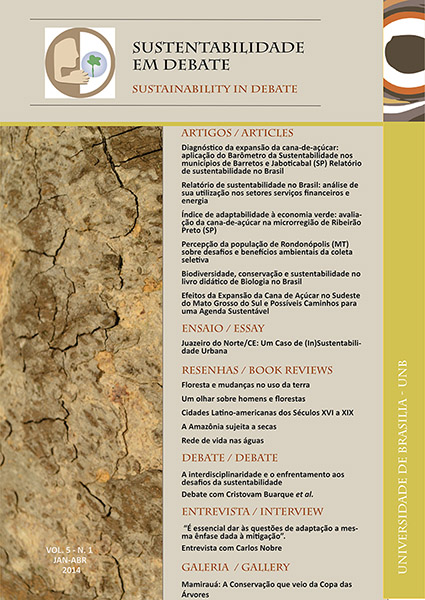Diagnóstico da expansão da cana-de-açúcar:
aplicação do Barômetro da Sustentabilidade nos municípios de Barretos e Jaboticabal (SP)
DOI :
https://doi.org/10.18472/SustDeb.v5n1.2014.9418Mots-clés :
Bioetanol, Cana-de-açúcar, Sustentabilidade, Barômetro da SustentabilidadeRésumé
Para reduzir emissões dos gases do efeito estufa e aumentar a segurança de suprimento energético, o interesse internacional por biocombustíveis tem crescido consideravelmente nos últimos anos. Com a crescente demanda e consequente expansão da produção, é inquestionável a necessidade de avaliar os impactos sobre a sociedade e o meio ambiente. O Brasil, com grandes áreas agricultáveis e a grande produção de cana-de-açúcar, além do conhecimento agregado por décadas de pesquisa e produção de bioetanol, possui potencial para expansão, mas as consequências devem ser analisadas além da simples viabilidade econômica. Para uma avaliação de impactos sociais da atividade canavieira foi aplicada a metodologia conhecida como Barômetro da Sustentabilidade para dois municípios do estado de São Paulo: um com forte expansão canavieira (Barretos), e outro com produção estagnada (Jaboticabal) no mesmo período de 10 anos. Com a comparação dos indicadores dos dois municípios buscou-se identificar a causalidade em relação à expansão da cultura em estudo. A aplicação do Barômetro da Sustentabilidade indica um impacto ambiental negativo no município com significativa expansão canavieira. Além disso, o município sem expansão teve melhora em seu desempenho de bem-estar humano, contra uma estabilização do indicador no município em que houve expansão.
Références
M. P. Remote sensing time series to evaluate direct land use change of recent
expanded sugarcane crop in Brazil. Sustainability, 4:574-585. 2012.
ARAÚJO, G.c. et al. Diagnosis of sustainability in the Brazilian city of Touros: An
application of the barometer of sustainability. Holos, Natal, v. 2, n. 29, p.161-171,
abr. 2013.
CANASAT. Monitoramento da Cana-de-açúcar via imagens de satélite. Disponível
em: http://www.dsr.inpe.br/laf/canasat/. Acesso em: 5 de dezembro de 2012.
COMPANHIA NACIONAL DE ABASTECIMENTO (CONAB). Acompanhamento de safra
brasileira: cana-de-açúcar, terceiro levantamento, safra 2011/2012. Brasília, 2011.
Disponível em: http://www.conab.gov.br/OlalaCMS/uploads/arquivos/
12_12_12_10_34_43_boletim_cana_portugues_12_2011.pdf. Acesso em: 13 de abril
2012.
EMPRESA BRASILEIRA DE PESQUISA AGROPECUÁRIA (Embrapa). Zoneamento
agroecológico da cana-de-açúcar. Embrapa Solos, Rio de Janeiro, 2009. 55 p.
EMPRESA DE PESQUISA ENERGÉTICA (EPE), Ministério de Minas e Energia (MME).
Plano Decenal de Expansão de Energia 2021. Ministério de Minas e Energia,
Empresa de Pesquisa Energética, Brasília, Brazil, 2012. 387 p.
GRAYMORE, Michelle L. M.; SIPE, Neil G.; ROCKSON, Roy E.. Regional sustainability:
How useful are current tools of sustainability assessment at the regional scale?.
Ecological Economics, Victoria, n. 67, p.362-372, jul. 2008.
GUIMARÃES, Lucy Teixeira; TURETTA, Ana Paula Dias; COUTINHO, Heitor Luiz da
Costa. Uma proposta para avaliar a sustentabilidade da expansão do cultivo da
cana-de-açúcar no estado do Mato Grosso do Sul. Sociedade&natureza;,
Uberlândia, v. 2, n. 22, p.313-327, ago. 2010.
INSTITUTO BRASILEIRO DE GEOGRAFIA E ESTATÍSTICA (IBGE). Área territorial oficial
- 2010. Resolução da Presidência do IBGE de n° 5 (R.PR-5/02). Disponível em: http:/
/www.ibge.gov.br/home/geociencias/areaterritorial/area.shtm. Acesso em: 15 de
maio de 2013.
INSTITUTO BRASILEIRO DE GEOGRAFIA E ESTATÍSTICA (IBGE). Mapa de biomas do
Brasil. Diretoria de Geociências, São Paulo, 2004.
INSTITUTO BRASILEIRO DE GEOGRAFIA E ESTATÍSTICA (IBGE). Sistema IBGE de
Recuperação Automática (SIDRA). Disponível em: http://www.sidra.ibge.gov.br/
bda/agric/. Acesso em: 15 de maio de 2013.
KRONEMBERGER, Denise Maria Penna et al. Desenvolvimento sustentável no Brasil:
Uma análise a partir da aplicação do Barômetro da Sustentabilidade.
Sociedade&natureza, Uberlândia, n. , p.25-50, jun. 2008.
PRESCOTT-ALLEN, R. The well-being of nations: A country-by-Country Index of
Quality of Life and the Environment. Island Press, Washington, DC. 342 p. 2001.
RONQUIM, C. C. Queimada na colheita de cana-de-açúcar: impactos ambientais,
sociais e econômicos. Campinas: Embrapa, 2010. 45 p.
TROCHIM, W. M. K. Establishing a Cause-Effect Relationship. Disponível em: http:/
/www.socialresearchmethods.net/kb/causeeff.php. Acesso em: 30 de junho de
2013.
UNIÃO DA INDÚSTRIA DE CANA-DE-AÇÚCAR (UNICA). Dados e Cotações ”“
Estatísticas, Produção Brasil, 2009. Disponível em: http://www.unica.com.br/
dadosCotacao/ estatistica. Acesso em: 10 de maio de 2012.
Téléchargements
Publié
Numéro
Rubrique
Licence
SUSTAINABILITY IN DEBATE – Copyright Statement
The submission of original scientific work(s) by the authors, as the copyright holders of the text(s) sent to the journal, under the terms of Law 9.610/98, implies in the concession of copyrights of printed and/or digital publication to the Sustainability in Debate Journal of the article(s) approved for publication purposes, in a single issue of the journal. Furthermore, approved scientific work(s) will be released without any charge, or any kind of copyright reimbursement, through the journal’s website, for reading, printing and/or downloading of the text file, from the date of acceptance for publication purposes. Therefore, the authors, when submitting the article (s) to the journal, and gratuitous assignment of copyrights related to the submitted scientific work, are fully aware that they will not be remunerated for the publication of the article(s) in the journal.
The Sustainability in Debate Journal is licensed under Creative Commons License – Non-Commercial-No-Derivation Attribution (Derivative Work Ban) 3.0 Brazil, aiming at dissemination of scientific knowledge, as indicated on the journal's website, which allows the text to be shared, and be recognized in regards to its authorship and original publication in this journal.
Authors are allowed to sign additional contracts separately, for non-exclusive distribution of the works published in the Sustainability in Debate Journal (for example, in a book chapter), provided that it is expressed the texts were originally published in this journal. Authors are allowed and encouraged to publish and distribute their text online, following publication in Sustainability in Debate (e.g. in institutional repositories or their personal pages). The authors expressly agree to the terms of this Copyright Statement, which will be applied following the submission and publishing by this journal.









